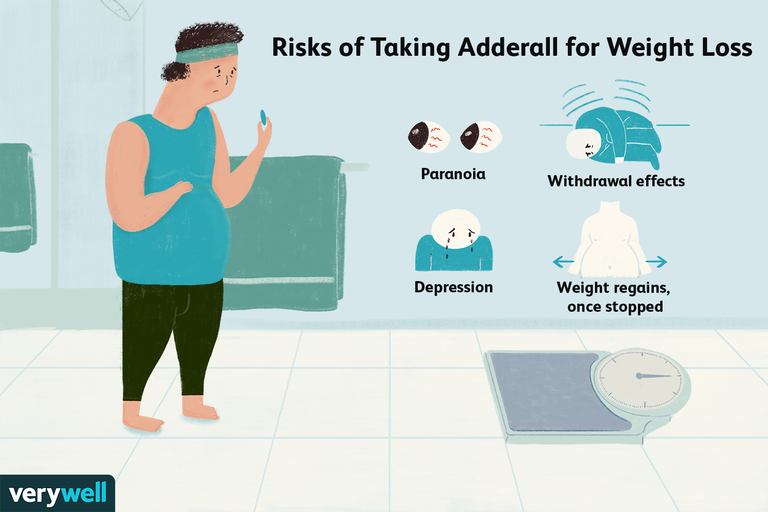In the quest for effective weight loss, many people turn to various methods, from diet changes to exercise regimens and even prescription medications. One such medication that has garnered attention for its potential weight loss effects is Adderall. Known primarily as a treatment for ADHD (Attention Deficit Hyperactivity Disorder), Adderall has also been associated with weight loss, either as a side effect or for those who use it off-label to shed pounds.
But how does Adderall contribute to weight loss? Is it safe, and what are the potential risks? In this article, we’ll break down the science behind Adderall’s impact on weight loss, the risks involved, and share real-life stories of those who have experienced this effect firsthand.
What Is Adderall?
Adderall is a prescription medication that combines two central nervous system stimulants: amphetamine and dextroamphetamine. It’s typically prescribed to individuals with ADHD or narcolepsy to improve focus, attention, and energy levels. However, due to its stimulating effects, many users experience side effects like appetite suppression and increased metabolism, which can contribute to weight loss.

The Science Behind Adderall and Weight Loss
The relationship between Adderall and weight loss is largely due to how the medication affects the body’s central nervous system. Here are the main scientific reasons Adderall can lead to weight loss:
1. Appetite Suppression
One of the most well-known effects of Adderall is its ability to suppress appetite. The drug stimulates the release of dopamine and norepinephrine, neurotransmitters that play a role in regulating mood, motivation, and hunger. By increasing these neurotransmitters, Adderall can reduce feelings of hunger, making it easier for users to eat less or skip meals.
“Adderall significantly reduces hunger cues in most users, which can lead to lower caloric intake over time,” explains Dr. Michael Greger, a nutrition and health expert. “However, this appetite suppression is temporary, and once the drug wears off, users may experience increased hunger.”
2. Increased Metabolism
Another factor contributing to weight loss with Adderall is its impact on metabolism. As a stimulant, Adderall increases heart rate and energy expenditure, which can lead to a higher number of calories burned throughout the day. This thermogenic effect is similar to what you might experience with caffeine or other stimulants.
By boosting metabolism, Adderall helps the body burn more calories, even at rest. This can result in weight loss, particularly for those who are already following a calorie-controlled diet or exercise routine.
3. Increased Energy and Activity Levels
Adderall is known for giving users a boost in energy and focus, which can lead to increased physical activity. Some users report feeling more motivated to exercise or move around, which can contribute to additional calorie burning and weight loss.
“After taking Adderall, I felt like I had the energy to get things done—whether it was working out or just being more active in general,” shared one user in a personal blog post.
While these factors may contribute to weight loss, it’s important to remember that Adderall is not approved by the FDA for weight loss purposes. Its use should be strictly monitored by a healthcare professional, especially because of the risks and potential side effects.
The Risks of Using Adderall for Weight Loss
While Adderall may contribute to weight loss, it’s not without serious risks—especially for those using it off-label or without a prescription. Here are some of the most significant risks associated with using Adderall for weight loss:
1. Potential for Addiction
Adderall is classified as a Schedule II controlled substance, meaning it has a high potential for abuse and dependency. Users can quickly develop a tolerance to the drug, meaning they may need higher doses to achieve the same appetite-suppressing or energy-boosting effects. This can lead to addiction or abuse, particularly for those using Adderall solely for weight loss purposes.
“Stimulant medications like Adderall can be habit-forming, and misuse of these drugs is a growing concern, especially among those who take them without medical supervision,” warns Dr. Beth Czerwony, a clinical dietitian.
2. Serious Side Effects
Adderall comes with a long list of side effects, including insomnia, anxiety, elevated heart rate, increased blood pressure, and mood swings. These side effects can worsen over time, especially with prolonged use or higher doses. In severe cases, users may experience heart problems, stroke, or mental health issues like paranoia or depression.
Additionally, when the effects of Adderall wear off, users can experience a crash—a period of extreme fatigue, irritability, and hunger. This crash can make it difficult to maintain long-term weight loss, as it often leads to binge eating or overeating to compensate for the calorie deficit caused by the drug.
3. Nutrient Deficiencies and Muscle Loss
Because Adderall suppresses appetite, some users may not consume enough nutrients to support a healthy metabolism or maintain muscle mass. Over time, this can lead to nutrient deficiencies or muscle wasting, especially if users aren’t following a balanced diet or getting enough protein. Losing muscle mass can actually slow down metabolism, making weight loss harder to sustain in the long term.
“While Adderall might reduce appetite in the short term, the risk of nutritional deficiencies and muscle loss is significant, especially for those who are not eating properly,” says Dr. Michael Greger. “This can lead to negative health outcomes that far outweigh any potential weight loss benefits.”

Real-Life Stories: Personal Experiences with Adderall and Weight Loss
Many people have shared their experiences with Adderall and weight loss, highlighting both the benefits and challenges they’ve encountered along the way. Here are a few real-life stories:
Sarah, a college student, started taking Adderall after being diagnosed with ADHD. She noticed that the medication helped her focus on her studies, but she also began losing weight. “I wasn’t trying to lose weight, but Adderall made me forget to eat sometimes, and I just didn’t feel hungry. I lost 10 pounds in a few weeks without even trying.”
However, Sarah also noted that when she stopped taking Adderall over the summer, her appetite came back with a vengeance. “I gained all the weight back and then some. I didn’t realize how much the medication was suppressing my hunger, and when I wasn’t on it, I ended up eating way more than usual.”
Another user, Mark, who was prescribed Adderall for narcolepsy, found that the medication helped him manage his sleep disorder while also leading to some unintended weight loss. “I definitely noticed I wasn’t as hungry, and I lost about 15 pounds in the first few months. But after a while, I started feeling jittery all the time, and my sleep was worse, even though the Adderall was supposed to help.”
Mark eventually had to adjust his dosage to minimize the side effects, but he found that the initial weight loss plateaued once his body adjusted to the medication.
Should You Use Adderall for Weight Loss?
While Adderall can lead to weight loss in some people, it’s important to remember that this medication is primarily prescribed for ADHD and narcolepsy. Using Adderall solely for weight loss purposes is not recommended due to the potential risks, including addiction, severe side effects, and the danger of nutrient deficiencies.
If you’re considering using Adderall for weight loss, it’s crucial to consult a healthcare provider. They can help you determine if this is an appropriate option based on your individual health needs and guide you toward safer, more sustainable weight loss strategies.
Alternatives to Adderall for Weight Loss
There are safer, more sustainable alternatives to using Adderall for weight loss. Here are some strategies to consider:
-
Balanced Diet and Exercise: A well-balanced diet rich in whole foods, lean proteins, and healthy fats, combined with regular exercise, remains one of the best ways to achieve long-term weight loss.
-
Natural Appetite Suppressants: Certain foods and supplements, like green tea, fiber-rich foods, and protein shakes, can help naturally suppress appetite without the risks associated with stimulants.
-
Mindful Eating: Practicing mindful eating techniques can help you manage hunger cues, avoid overeating, and develop a healthier relationship with food.
-
Professional Guidance: Consider working with a dietitian, personal trainer, or healthcare professional who can provide a tailored approach to weight loss that prioritizes your health and well-being.
FAQs About Adderall and Weight Loss
1. Can Adderall be prescribed for weight loss?
No, Adderall is not FDA-approved for weight loss and should only be used for its prescribed purpose, such as treating ADHD or narcolepsy.
2. How much weight can you lose on Adderall?
Weight loss varies from person to person, but some users report losing 5-15 pounds within the first few weeks or months of taking Adderall due to appetite suppression.
3. Is it safe to use Adderall for weight loss?
Using Adderall for weight loss is not considered safe, as it can lead to addiction, nutrient deficiencies, and serious side effects like heart problems and mental health issues.
4. Does Adderall permanently reduce appetite?
No, the appetite-suppressing effects of Adderall are temporary. Once the medication wears off, appetite typically returns, and users may experience increased hunger.
5. What are the long-term effects of using Adderall?
Long-term use of Adderall can lead to dependency, tolerance, and a range of health issues, including cardiovascular problems, anxiety, and cognitive decline.
Conclusion: The Risks and Realities of Using Adderall for Weight Loss
While Adderall may contribute to weight loss in some users, it’s essential to understand the risks and limitations of using a prescription stimulant for purposes outside its intended use. The short-term benefits of appetite suppression and increased energy are often outweighed by the long-term risks, including addiction, side effects, and potential harm to your overall health.
If you’re looking to lose weight, it’s always safer to pursue sustainable lifestyle changes, including a balanced diet and exercise, rather than relying on medication. For those considering using Adderall, it’s crucial to work with a healthcare provider to ensure it’s the right choice for your individual needs.
Leave a Reply
You must be logged in to post a comment.